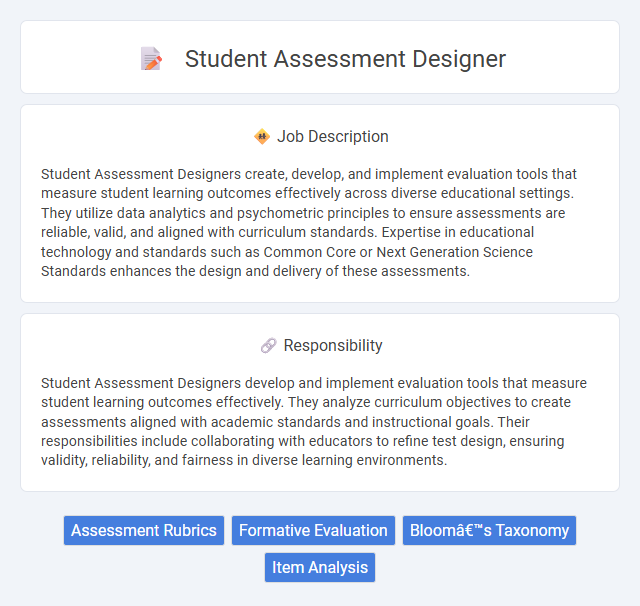
Student Assessment Designers create, develop, and implement evaluation tools that measure student learning outcomes effectively across diverse educational settings. They utilize data analytics and psychometric principles to ensure assessments are reliable, valid, and aligned with curriculum standards. Expertise in educational technology and standards such as Common Core or Next Generation Science Standards enhances the design and delivery of these assessments.
Individuals with strong analytical skills and a keen attention to detail are likely to be well-suited for the role of Student Assessment Designer, as the job involves creating precise and fair evaluation tools. Those who are comfortable working with data, educational standards, and learning outcomes may find this position aligns with their strengths and interests. Candidates who prefer structured tasks over spontaneous or ambiguous work environments might have a higher probability of thriving in this role.
Qualification
A Student Assessment Designer must possess a deep understanding of educational standards, assessment theories, and psychometrics to create valid and reliable evaluation tools. Proficiency in data analysis software, such as SPSS or R, combined with experience in curriculum development and educational technology, is essential. Strong skills in instructional design, content alignment, and the ability to interpret assessment results to inform instructional strategies are critical qualifications for this role.
Responsibility
Student Assessment Designers develop and implement evaluation tools that measure student learning outcomes effectively. They analyze curriculum objectives to create assessments aligned with academic standards and instructional goals. Their responsibilities include collaborating with educators to refine test design, ensuring validity, reliability, and fairness in diverse learning environments.
Benefit
Student Assessment Designer roles likely offer the benefit of directly influencing educational outcomes by creating effective and tailored evaluation tools. There may be opportunities to collaborate with educators and subject matter experts, enhancing professional development and subject mastery. The position probably provides a dynamic work environment that fosters creativity and continuous learning, which can be highly rewarding.
Challenge
Designing student assessments likely presents the challenge of balancing rigor with fairness, ensuring tests accurately measure diverse learning outcomes without bias. Adapting assessments to accommodate varied educational standards and technological advancements may require continuous innovation and critical problem-solving. The role probably demands a deep understanding of pedagogical theories and assessment methodologies to create valid, reliable, and engaging evaluation tools.
Career Advancement
Student Assessment Designers specializing in educational measurement and psychometrics gain opportunities for career advancement by mastering data-driven evaluation techniques and assessment technology integration. Expertise in curriculum alignment and adaptive testing platforms positions professionals for leadership roles such as Assessment Director or Educational Consultant. Continuous skill development in educational standards and analytics enhances prospects for senior roles in academic institutions and edtech companies.
Key Terms
Assessment Rubrics
Assessment Rubrics are critical tools for Student Assessment Designers, providing clear criteria to evaluate student performance consistently and objectively. These rubrics enhance the reliability and validity of assessments by breaking down complex tasks into measurable components aligned with learning outcomes. Expertise in developing detailed, standards-based rubrics enables designers to support diverse learner needs and improve feedback quality in educational settings.
Formative Evaluation
Student Assessment Designers specializing in formative evaluation create tools and strategies to monitor student learning continuously and provide real-time feedback for instructional improvement. They employ data analytics to tailor assessments that identify knowledge gaps and support personalized learning paths. Expertise in educational technology, psychometrics, and curriculum alignment ensures the development of valid, reliable, and actionable formative assessments that enhance student outcomes.
Bloom’s Taxonomy
A Student Assessment Designer utilizes Bloom's Taxonomy to create effective evaluation tools that measure cognitive skills across multiple levels, including knowledge, comprehension, application, analysis, synthesis, and evaluation. This role involves designing assessments that align with learning objectives to accurately gauge student understanding and promote higher-order thinking. Expertise in developing rubrics and formative assessments ensures targeted feedback and supports educational outcomes.
Item Analysis
Student Assessment Designers specialize in creating and refining assessment tools by conducting detailed item analysis to evaluate question effectiveness and reliability. They analyze response patterns, difficulty indices, and discrimination values to ensure valid measurement of student knowledge and skills. By interpreting statistical data from assessments, these professionals optimize test items to improve learning outcomes and maintain assessment integrity.
 kuljobs.com
kuljobs.com